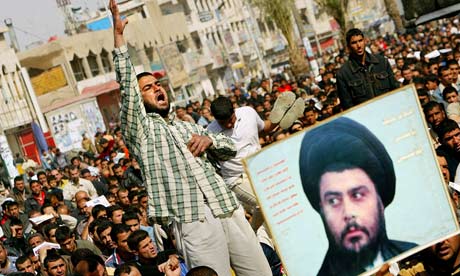
Moqtada al-Sadr, the leader of Iraq's Sadrist movement, has returned to the country after three years in exile in Iran and less than a fortnight after his backing helped usher in a new Iraqi government.
The vehemently anti-western cleric arrived in the Shia holy city of Najaf this afternoon. His surprise return came without fanfare or an announcement.
But word of the cleric's arrival was beginning to filter around Iraq's Shia strongholds, which remained fiercely loyal to Sadr during his time in exile.
"I can confirm that Sheikh Moqtada al-Sadr is in Najaf," Sheikh Hazem al-Areji, from the cleric's Najaf office, said.
The streets of Sadr City and other eastern Baghdad neighbourhoods have so far remained calm, although some waved banners and played anthems of Sadr's Mahdi Army militia, which was a dominant player in the brutal sectarian war in 2006-2007.
Sadr had vowed not to return to Iraq until all US forces had left the country. Around 45,000 troops remain, but only a small number are combat troops and all are now under the ultimate direction of the Iraqi government.
The wane in US power over the country it invaded eight years ago, coupled with a return to political prominence for Sadrists, seems to have been enough to lure Sadr back to Najaf, which he fled in 2004 after it was surrounded by US troops.
The Sadrist bloc won 39 seats in Iraq's new parliament and was given eight ministries by the prime minister, Nouri al-Maliki, whose return as leader was made possible by Sadr's backing, in turn brokered by his hosts in Iran.
The Sadrist backing was crucial to Maliki's return. It came after two years of bitter enmity between the two men, which had seen Maliki send the Iraqi army after Mahdi Army forces and led to an arrest warrant being issued for Sadr.
Ever since the Iranian-brokered detente, struck last September, western and Iraqi officials in Baghdad have been wondering about the demands Sadr would make to the government for his backing.
He is widely seen as being a key figure in an invigorated Iranian putsch in Iraq, which is coinciding with the US military drawdown and its decreasing diplomatic influence.
There has been intense speculation in Baghdad government circles that Sadr may be used to force a changing of the guard in Najaf, where Iraq's leading Shia cleric, Ayatollah Ali Shistani, has been in a prolonged power struggle with Iran's Mullahs and ruling class for ultimate influence over the region's Shia Muslims.







